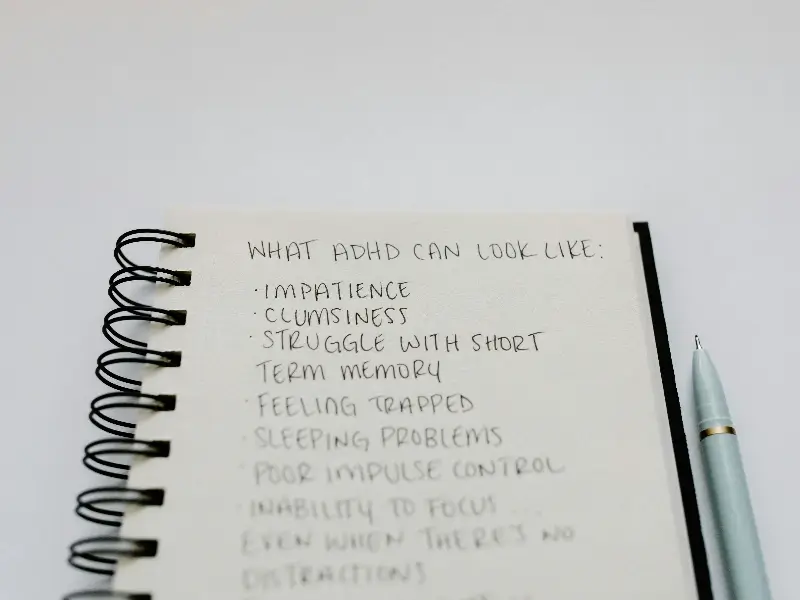ADHD medication can sharpen focus, curb impulsivity, and make daily tasks more manageable.
But it doesn’t always come without side effects.
Stimulants like Adderall, Concerta, Focalin, and Azstarys are some of the most common treatments, but they might cause sleep problems, appetite changes, mood swings, or other issues.
Nearly half of people on ADHD medication experience side effects, though only 21% find them disruptive.
The good news? Many side effects fade as your body adjusts, and there are ways to manage the ones that persist.
Working with your doctor can help you find a treatment that improves focus without unnecessary discomfort.
Common Side Effects of ADHD Medications
Loss of Appetite and Weight Changes
One of the most common side effects of ADHD medications is appetite suppression.
Many people, especially children, notice they don’t feel as hungry during the day, leading to weight loss over time.
This can be concerning for parents who worry about their child’s growth or for adults trying to maintain a healthy diet.
To manage this, try scheduling meals around the times when the medication is at its weakest, such as before taking it in the morning or after it starts wearing off in the evening.
High-protein and high-calorie foods can also help ensure enough nutrients are being consumed.
If appetite suppression becomes too severe, talk to your doctor about adjusting the dosage or switching to a different medication.
Insomnia and Sleep Problems
Some ADHD medications are stimulants, which can interfere with sleep if taken too late in the day.
Many people report difficulty falling or staying asleep, leading to exhaustion the next day.
If you or your child is struggling with sleep, consider taking the medication earlier in the morning to allow it to wear off by bedtime.
A consistent bedtime routine, reducing screen time before sleep, and avoiding caffeine can also help.
If sleep problems persist, your doctor may recommend a lower dose or a different type of medication, such as non-stimulant options.
Increased Heart Rate and Blood Pressure
Some people notice their heart beating faster or feel a slight increase in blood pressure after taking ADHD medication.
This is more common with stimulant medications and may not be noticeable for everyone.
If you have a history of heart problems, it’s essential to talk to your doctor before starting ADHD treatment.
Staying hydrated, avoiding caffeine, and practicing relaxation techniques can help manage this side effect.
If you ever feel chest pain, dizziness, or severe discomfort, seek medical attention immediately.
Mood Swings and Irritability

ADHD medications may lead to mood fluctuations, particularly as their effects diminish.
You might feel more irritable, anxious, or even experience mood swings.
This is sometimes referred to as the “crash” that happens when the medication leaves your system.
Managing this involves paying attention to when symptoms occur and discussing them with your doctor.
Sometimes, adjusting the dosage, adding a short-acting medication in the afternoon, or switching medications can help.
Practicing mindfulness, exercise, and having a structured routine can also improve mood stability.
Headaches and Stomach Issues
Some people experience headaches or stomach pain when taking ADHD medication, especially when first starting.
These symptoms often improve over time as the body adjusts, but they can be frustrating in the beginning.
Drinking plenty of water, eating before taking medication, and avoiding too much caffeine can help.
If headaches or stomach pain persist, discuss it with your doctor, as a different medication might be a better fit.
How to Manage ADHD Medication Side Effects
Work with a Psychiatrist for ADHD Near You
If you’re struggling with side effects, a psychiatrist for ADHD near you can help.
A doctor will monitor your symptoms, adjust your medication, and ensure your treatment plan works for you.
CNS Center Arizona helps patients find the right balance of medication for their needs.
Managing ADHD medication takes time. Some side effects appear immediately, while others develop later.
A specialist can help you understand what’s normal and when adjustments are needed.
If you’re in Arizona and need a doctor who listens, CNS Center Arizona is here to guide you.
Adjust Dosage or Medication Type
Not all ADHD medications work the same. If side effects are severe, your doctor may adjust the dosage or switch you to a different option.
Some people find that Concerta feels different from Adderall, while others prefer non-stimulant options.
Finding the right medication depends on your response, medical history, and lifestyle.
If needed, a psychiatrist can lower your dose or suggest a non-stimulant like Strattera.
Be honest about how you’re feeling. Some worry that reporting side effects means stopping medication, but small adjustments can help.
Supportive Lifestyle Changes

Medication helps, but lifestyle changes can improve ADHD symptoms too.
Eating well, staying active, sleeping better, and using behavioral strategies all support overall well-being.
Diet and Nutrition
What you eat affects your focus and energy.
Protein, healthy fats, and complex carbs help stabilize blood sugar and mood.
Processed foods, sugar, and too much caffeine can make symptoms worse.
A food journal can help identify triggers. Some people react to artificial additives like food dyes.
Here at CNS Center Arizona, we encourage patients to explore how diet affects ADHD.
Exercise and Movement
Exercise boosts dopamine and norepinephrine, improving focus and reducing stress.
You don’t need intense workouts; walking, swimming, or yoga can help.
Short, frequent activities often work best.
If you’re in Arizona, try hiking, biking, or visiting the Desert Botanical Garden for fresh air and movement.
Sleep Hygiene
ADHD often disrupts sleep, leading to more impulsivity and brain fog.
A proper bedtime routine can help; limit screens before bed, keep your room cool and dark, and stick to a schedule.
White noise or weighted blankets may also improve rest.
If sleep issues continue, talk to your doctor about adjusting medication timing.
Behavioral Strategies
Medication improves focus but doesn’t teach organization skills.
Simple strategies like reminders, task breakdowns, and visual schedules can help.
For kids, structured routines and positive reinforcement provide stability.
Adults may benefit from planners, phone alarms, and time-blocking methods.
Our doctors at CNS Center Arizona help patients find practical strategies that work for them.
Finding Support in Arizona
ADHD can be tough, but you’re not alone.
Support groups, therapy, and working with a knowledgeable psychiatrist can help.
Arizona offers many resources, from community programs to specialized ADHD clinics.
If you need guidance, CNS Center Arizona is here to help you manage your ADHD better.
We understand the challenges of ADHD and are committed to helping patients find the right medication and treatment route.
Get the Support You Need for ADHD Management at CNS Center Arizona
Finding the right ADHD medication takes time, and side effects can be part of the process.
The good news is that many side effects can be managed with the right approach, either through dose adjustments, switching medications, or small lifestyle changes.
If you’re experiencing challenges with Concerta, Adderall, Focalin, or Azstarys, a psychiatrist can help you find the best solution.
Our team at CNS Center Arizona specialize in providing proper ADHD treatment for our patients.
If medication side effects are making treatment difficult or you need guidance on your options, we’re here to help.
Our team works with patients across Arizona to find solutions that fit their needs and lifestyle.
If you’re looking for professional care, reach out today – better treatment starts with the right support.






